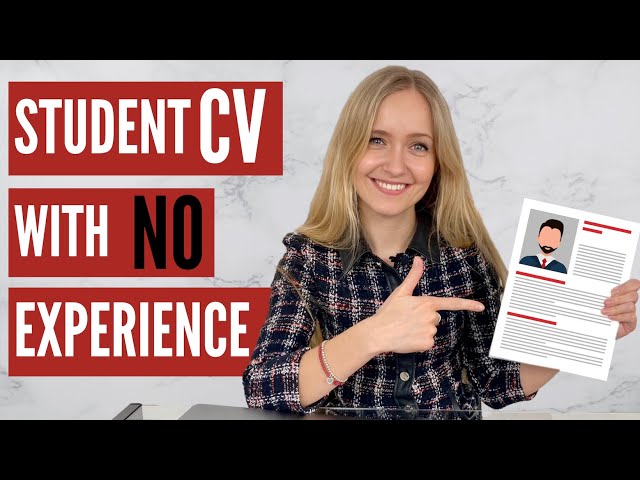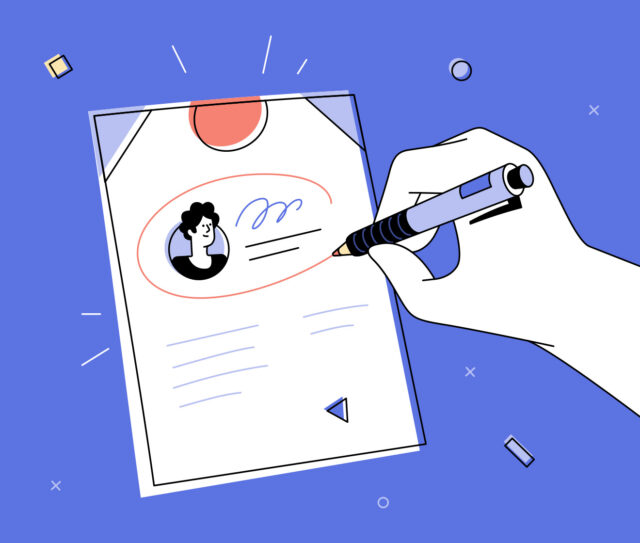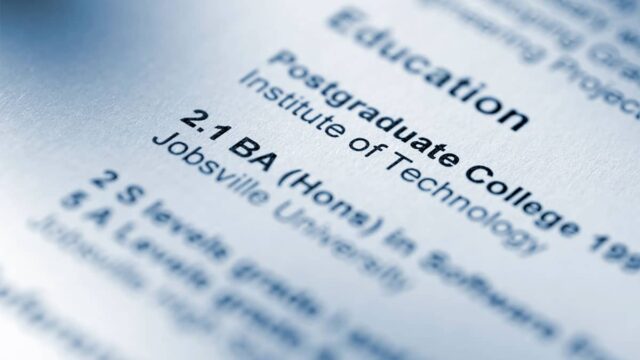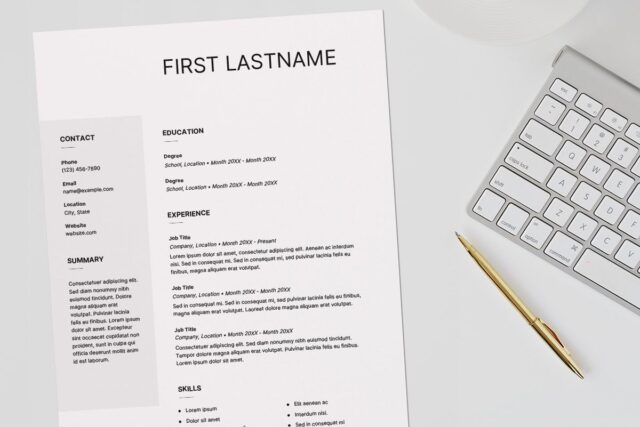
Your curriculum vitae (CV) otherwise known as your resume is a powerful tool that can unlock great doors for you. For most students who are just starting on the road to being a professional, getting just the right resume to fit your profile can be a challenge.
We’re here to help you with the one-minute resume. It’s a one-minute resume because a potential employer should be able to skim through it quickly and decide on the spot whether they want you or not.
Whether you’re a high school student, a college undergraduate, or pursuing a graduate degree, we’ll provide you with practical examples and insights to help you craft a CV that leaves a lasting impression. This article was written by Royalwriter, a well-known essay writing service in UK.
Why Create a Student CV?

Creating a student CV is not merely a formality; it’s a strategic move that can significantly impact your academic and professional journey. Let’s delve deeper into the reasons why crafting a student CV is essential:
1. Showcasing Your Potential
A well-crafted CV allows you to present your potential to universities, employers, mentors, or scholarship committees. It’s your canvas to illustrate your skills, achievements, and aspirations, conveying that you’re a promising candidate worth considering.
2. Setting a Professional Tone
By creating a CV, you set a professional tone from an early stage in your academic and career path. It signals to others that you take your education and future seriously and are committed to presenting yourself in a polished and organized manner.
3. Tailored for Specific Opportunities
Unlike a generic document, a CV can be tailored for specific opportunities. Whether you’re applying for a research position, an internship, or a scholarship, you can customize your CV to emphasize the qualifications and experiences most relevant to that opportunity.
4. Networking and Mentorship
Having a CV readily available allows you to engage with professors, mentors, or professionals in your field more effectively. It provides a concrete summary of your background, making it easier for potential mentors or collaborators to assess your suitability for research projects or academic partnerships.
5. Preparation for Future Success
Crafting a CV as a student is excellent preparation for your future career. It instills valuable skills such as organization, attention to detail, and effective communication, which are vital in academia and the workforce.
Next, we’ll go through why you need to keep your essay short, clear, and concise and why we call it the one-minute resume.
The 1-Minute Rule and Psychological Impact

The concept of a 1-minute resume stems from the psychology of first impressions and cognitive load. That means that the hiring manager will probably be already predisposed to telling a real from a fake and someone trying too hard with an otherwise lengthy resume. Here’s why a shorter, more concise resume is recommended:
1. Attention Span
Recruiters and admissions committees often have limited time to review each CV. A lengthy document may overwhelm them, leading to important details being overlooked. By condensing your CV into a 1-minute read, you increase the chances of key information being noticed and remembered.
2. Cognitive Load
Cognitive load refers to the mental effort required to process information. A lengthy CV can impose a high cognitive load on the reader, making it challenging to absorb and retain information. By presenting a concise document, you reduce cognitive load and make it easier for the reader to digest your qualifications.
3. Psychological Impact
A shorter, well-organized CV can have a positive psychological impact on the reader. It conveys professionalism, clarity, and respect for their time, and also shows that you are very much aware of yourself. Moreover, it suggests that you have carefully curated your qualifications, emphasizing quality over quantity.
4. Memory and Recall
Psychologically, shorter documents are easier to remember and recall. When a recruiter or committee reviews multiple CVs, a concise one is more likely to leave a lasting impression, increasing the chances of being shortlisted.
The 1-minute rule for resumes aligns with principles of cognitive psychology and the demands of a fast-paced selection process. By sticking to this tip, you have a better chance to make a professional impact even with little experience.
Structuring Your Student CV

Since you are probably working with minimal information and your experience is limited, you should try to keep your resume as minimalist as possible. However, don’t be afraid to experiment and add a little flair, especially if you are in the arts and creative spaces. Check out the design above from Canva.
Once you are ready to go, follow the steps to build your resume:
Contact Information
Start with your contact details, including your full name, phone number, email address, and location. Make sure your email address is professional (e.g., firstname.lastname@email.com).
Example:
John Doe
Phone: (123) 456-7890
Email: john.doe@email.com
Address: 123 Main Street, City, State ZIP
Personal Statement or Objective
Your personal statement is your opportunity to make a strong first impression. Craft a brief, captivating statement that highlights your skills, achievements, educational qualifications, ambitions, and what you bring to a position or employer.
For example: As a motivated and detail-oriented student pursuing a degree in Computer Science, I am eager to apply my problem-solving skills and passion for coding to contribute to innovative software projects.
Education
In the education section, list your academic qualifications starting with the most recent. Include the name of the institution, the program or major, dates of attendance, expected graduation date (if applicable), GPA (if impressive), honors, and relevant courses or projects.
Example:
Bachelor of Science in Computer Science
XYZ University
Expected Graduation: May 20XX
GPA: 3.7/4.0
Relevant Courses: Data Structures, Algorithms, Software Engineering
Work Experience
Even if you have limited paid work experience, include relevant roles such as internships, volunteer work, or part-time jobs. Highlight your responsibilities, skills gained, and achievements. Use action verbs and quantify your accomplishments where possible.
Example:
Software Development Intern | ABC Tech Solutions | Summer 20XX
– Collaborated with a cross-functional team to develop a mobile app, resulting in a 30% increase in user engagement.
– Debugged and optimized code, improving app performance and reducing crash rates by 20%.
Skills
Create a skills section where you list your technical, soft, and general competencies. Include programming languages, software tools, communication skills, and any other relevant abilities.
Skills:
– Programming Languages: Python, Java, JavaScript
– Tools: Git, Visual Studio Code, JIRA
– Problem Solving
– Team Collaboration
Additional Sections
Depending on your experiences and accomplishments, you can consider adding these optional sections to enhance your CV:
- Languages: Mention any foreign languages you’re proficient in.
- Certifications and Awards: Include any relevant certifications or academic awards.
Don’t forget to highlight volunteer work that demonstrates your commitment and skills. Again, you can hire essay writer to create a custom resume for you, or you can find freely available samples for download online.
Proofread and Edit
After creating your student CV, proofread and edit it meticulously. Typos and grammatical errors can tarnish an otherwise impressive CV. Use online tools to check for errors and consider seeking feedback from mentors or career advisors to enhance your CV’s quality.
Aligning Your Aspirations With Employers

It’s crucial to recognize that landing a job isn’t just about securing a paycheck—it’s about aligning your aspirations with the mission, vision, and purpose of your potential employers. Therefore, due diligence and profiling potential employers are some of the most essential elements when writing your student CV.
Meaningful Career Trajectory
Understanding an organization’s mission and values allows you to envision your career trajectory within that context. How does this job align with my long-term goals? Will I find personal and professional fulfillment working here?
Enhanced Job Satisfaction
When your values and aspirations align with those of your employer, job satisfaction tends to soar. You’re more likely to find meaning and purpose in your work, which can lead to increased motivation, creativity, and overall job satisfaction.
Effective Resume Tailoring
Profiling your potential employers provides valuable insights for tailoring your resume. You can emphasize experiences, skills, and achievements that align with the company’s goals and values. This not only increases your chances of getting noticed but also demonstrates your proactive approach to prospective employers.
Successful Interviews
During interviews, showcasing your knowledge of the company’s mission and vision sends a powerful message. It illustrates your genuine interest and commitment to the role, which can set you apart from other candidates. Furthermore, it enables you to ask insightful questions about the organization, demonstrating your engagement and curiosity.
Cultural Fit
Understanding an organization’s culture helps you assess whether you’d be a good fit. Cultural fit goes beyond skills and qualifications—it encompasses shared values, work ethic, and teamwork. Aligning yourself with a company that shares your values can lead to a more harmonious and productive work environment.
That’s It for the One-Minute Resume

Congratulations! You’ve successfully created your first student resume, a key that will open great doors for your future. Remember the lessons here; keep it short and sweet,
By following these guidelines and using practical examples, you can create a 1-minute resume that effectively showcases your qualifications and makes you a standout candidate in the academic and professional world. Remember, your CV is your brand, so make it count.












